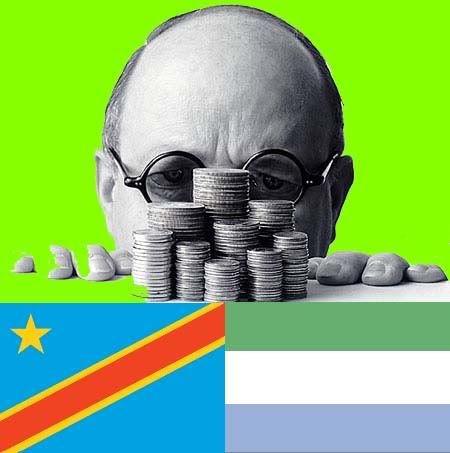I spent the first half of primary school in a harbour town on the west coast of Scotland. Every morning, the teacher would produce a "black babies' box", and as it went the rounds just about everybody would put a coin or two into it. Then it disappeared, and I found out later that the black babies' box was an early victim of political correctness, considered patronising towards Africans.
Fast forward m
 ore years than I care to count to a few weeks ago, when I went into a supermarket. A big sign in the household products aisle proclaimed that two shots of vaccine would be sent to Africa for every box of a certain washing-powder sold. I went home and had a slow-burning explosion, and the next day returned to the supermarket to confront the manager, but all signs of the promotion had disappeared - I think somebody with a shorter fuse had gotten there ahead of me.
ore years than I care to count to a few weeks ago, when I went into a supermarket. A big sign in the household products aisle proclaimed that two shots of vaccine would be sent to Africa for every box of a certain washing-powder sold. I went home and had a slow-burning explosion, and the next day returned to the supermarket to confront the manager, but all signs of the promotion had disappeared - I think somebody with a shorter fuse had gotten there ahead of me.Suffering Africans seem to be big business. It's difficult to go into a store now without being confronted by pallets of mineral water with pictures of black kids' faces on them, each promising that if you buy a litre of a particular brand then a drought-wracked land will get ten litres, or a well will be built whose pump looks like a roundabout so that defeating diorrhoea will seem like kids' play (I kid you not), or some other worthy undertaking will be, er, undertook. On those occasions when I buy mineral water I feel no guilt at purchasing a brand whose receptacle does nothing other than hold the contents, because many folk who buy the ideologically beautiful bottles are doing the same as me: refilling them with tapwater until they fall apart or get lost.
The makers of the Comic Relief telethon, which focusses on poverty in Great Britain and Africa, seem to have hit upon the potential of starving Africans to boost not sales but careers. It was inspired by the Ethiopian famine of 1985, the man-made disaster that gave us Live Aid. I am by no means stating that every celebrity who appears on Comic Relief, which airs every two years, is there to boost their reputation (Lenny Henry and Billy Connolly, for example, have no need of profile-botox), but even scriptwriters have picked up on the ethics of more mercenary celebrities queueing for their turn to weep in shanty-towns that this YouTube video was released as a bona-fide sketch in the last Comic Relief. It is funny and educational, but contains some very strong language.
One of the highlights of Comic Relief 2009, we're told, will be [Dawn] French and [Jennifer] Saunders "together for the last time". That really will be a highlight. I say this because during their 2005 Christmas special, doing a series of spoofs on films, a parody of Vera Drake contained a "comedy" abortion that made Maxima and I feel sick.
Abortion is ofte
 n mentioned in the same breath as Comic Relief because the makers have never been able to shake of the stigma of being grant-makers for organisations which provide abortions at abroad and at home under the guise of "reproductive health" - an agenda which features in Comic Relief work in Sierra Leone and Democratic Republic of the Congo.
n mentioned in the same breath as Comic Relief because the makers have never been able to shake of the stigma of being grant-makers for organisations which provide abortions at abroad and at home under the guise of "reproductive health" - an agenda which features in Comic Relief work in Sierra Leone and Democratic Republic of the Congo.In defining reproductive health, the World Health Organisation excels itself in masterful obfuscation by referring to the need to avoid unsafe abortion, citing some surprisingly precise statistics on induced abortion from areas where infrastructure, numeracy and properly-trained clinicians can be minimal. Referring to unsafe abortion as the persistent public health problem, it mandates itself with the task of formulating "evidence-based technical and policy guidance on safe abortion" with the assurance that induced abortion does not increase breast cancer risk.
They possibly feel safe to make this statement, given that in a review of evidence Fregene and Newman found that "Women from sub-Saharan Africa were found to have a low incidence of breast cancer". In localities where medication is hard to come by, moreover, I don't imagine a woman who dies of breast cancer some time after an abortion would be certified as having died of complications of the procedure. The WHO is also silent on the relationship between abortion and depression, post-traumatic stress disorder and later miscarriage, just to name three.
There's more to helping people more disadvantaged than oneself than fighting abortion,
 but a twelve-year-old friend of Minima's put it in a nutshell: "if you want to help people, you've got to let them be born first". Surely: in 2007, Conservative MEP and Operation Black Vote activist Nirj Deva said that the reproductive health agenda "has very little to do with 'a woman's right to choose', and a lot to do with controlling population figures in the third world within what the 'West' feels is a manageable amount". I think Matthew Connelly, author of Fatal Misconception - The Struggle to Control World Population, would agree.
but a twelve-year-old friend of Minima's put it in a nutshell: "if you want to help people, you've got to let them be born first". Surely: in 2007, Conservative MEP and Operation Black Vote activist Nirj Deva said that the reproductive health agenda "has very little to do with 'a woman's right to choose', and a lot to do with controlling population figures in the third world within what the 'West' feels is a manageable amount". I think Matthew Connelly, author of Fatal Misconception - The Struggle to Control World Population, would agree.Here in the UK, I was interested to read the thoughts of one of my favourite bloggers, Radagast, on Comic Relief, as he is a schoolteacher and the Comic Relief agenda is being shoved down children's throats in a big way. He writes:
according to the Society for the Protection of Unborn Children's Charities Bulletin 2006, Comic Relief have given (through Charity Projects Ltd, to whom all their grants are covenanted) large grants to Brook Advisory, Marie Stopes International, the International Planned Parenthood Federation and organisations overseas involved in 'reproductive health'. All of these groups promote or provide abortions to young girls and women.It's important to unpack this in the context of individual cases - for example, the Mail on Sunday tells the story of a woman who had had her third abortion by the age of 26, and eventually became one of the 50+ women every year to notch up her seventh abortion, with devastating psychological attrition. Reporting on a record level of abortions in 2005, the Telegraph revealed that the proceedure had been carried out on 33 girls under 13 between 2003-2005 - girls the same age as or younger than Minima's friend.
I don't deny that Comic Relief does some good work, I merely do not intend to donate in a situation where control over how the money is spent ends when I hang up. Neither am I asking people to boycott watching the telethon - although thankfully I have somewhere else to be; I just think it would be better to identify and research charities for yourself and with the help of friends. Have a laugh at the sketches, some of them are funny; use the vignettes as a chance to discover charities you might want to find out more about and, although there are no advertising breaks, you can always make a cuppa when the celebs switch on the sobs.

And if you can't give money, find a charity you like and see if you can give some time. Who knows, perhaps things might get better in the end if, for charitable giving as individuals, we go back to putting coins into boxes passed from hand to hand, and keeping track of where the pennies go.











Speaking of water and wells, I like Water for the People. Their website has some great photos.
ReplyDeletewww.waterforpeople.org
That is a brillian site! I've had a look through it, and will explore it some more when I come back.
ReplyDeleteHow are you doing?
I am SO tired! Was a bit depressed at work, as I always am when threatening a cold or something, but otherwise - I'm fine!
ReplyDeleteLinda still can't post on your site, apparently. I was looking forward to her adding her two-bits' worth.
Re the charity above: see the list of folks on the Board of Directors. It's interesting, too.
It's interesting all right; some people's names are down more than once - I wonder what that's about?
ReplyDeleteI can't post on any site until I'm logged into my account, although I should be able to do this without signing in. I don't know what that's about, and I haven't had an answer from Blogger. I'll try the fellow from "Blogger Tips and Tricks".
Sorry to hear you're not feeling well at work. I have exactly the sameproblem: if I'm incubating something, usually a cold, I feel so down, before any physical sign of it appears. I hope it breaks and gets over with soon. -FD